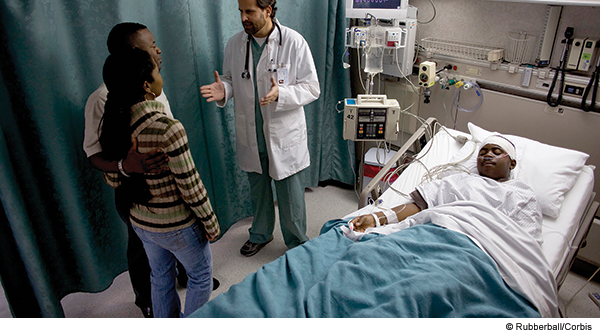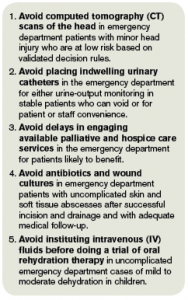
During ACEP’s annual conference in Seattle last fall, the College released its five recommendations for inclusion in the Choosing Wisely campaign. These recommendations were the culmination of almost two years of dialogue with members and a structured process undertaken by an expert panel of practicing emergency physicians and experts in cost-effectiveness, quality, patient safety, and clinical processes.1
Explore This Issue
ACEP Now: Vol 33 – No 05 – May 2014The mission of Choosing Wisely—a multiyear effort of the ABIM Foundation with more than 80 national, regional, and state medical specialty societies as well as consumer groups—is to promote conversations among physicians and patients about using appropriate tests and treatments and avoiding care when harm may outweigh benefits.
Although the Choosing Wisely campaign has brought renewed attention to critical decision making, our responsibility as emergency physicians extends far beyond these five recommendations and must include patients’ perspectives on the care they receive.

Table 1. The following five Choosing Wisely recommendations were approved by ACEP’s Board of Directors
Shared Decision Making
Shared decision making (SDM) is an important practice in emergency medicine. Although the ED environment poses challenges to communication and decision making, a recent study demonstrated that SDM is feasible and offers benefits to patients in the ED setting.2 Professional training and decision aids for patients can promote the adoption of SDM in the health care setting.3
ACEP’s Code of Ethics for Emergency Physicians states:
To choose and act autonomously, patients must receive accurate information about their medical conditions and treatment options. Emergency physicians should relay sufficient information to patients for them to make an informed choice among various diagnostic and treatment options. Emergency physicians, when speaking to patients and families, must not overstate their experience or abilities, or those of their colleagues or institution.
Table 1 illustrates an approach to SDM regarding diagnostic testing in the ED.
Each of the five issues raised by the Choosing Wisely campaign is amenable to SDM. A conversation between the emergency physician and the patient should bring together the physician’s recommendation combined with the patient’s individual goals and preferences.
Stewardship of Resources
Stewardship of resources is an important professional responsibility. Balancing the responsibility to be wise stewards of resources with the responsibility to make the correct diagnosis in the ED can be challenging. According to ACEP’s Code of Ethics for Emergency Physicians, emergency physicians shall act as responsible stewards of the health care resources entrusted to them.4 The Code of Ethics goes on to explain:
Pages: 1 2 3 | Single Page





No Responses to “ACEP’s Choosing Wisely Recommendations Stress Importance of Shared Decision Making in Emergency Medicine”